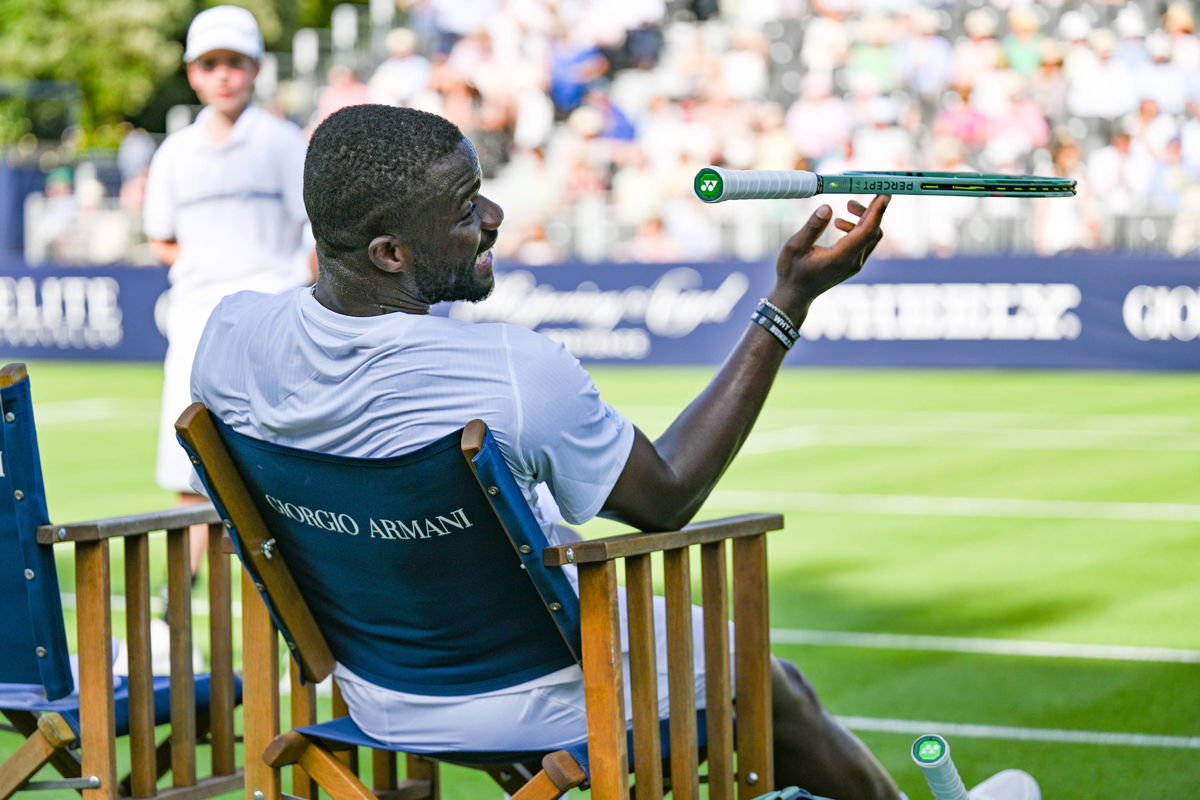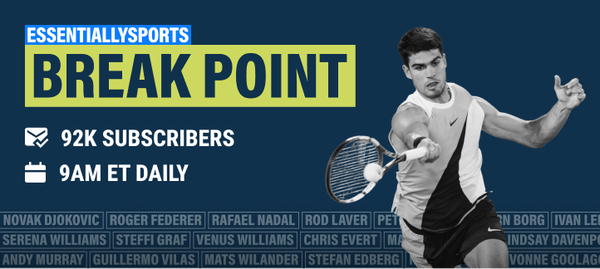
Imago
ATP, Tennis Herren Exho Singles Christopher Eubanks USA vs Frances Tiafoe USA during The Giorgio Armani Tennis Classic at the Hurlingham Club, London, UK on 25 June 2025. Copyright: xPhilxHutchinsonx 43550038

Imago
ATP, Tennis Herren Exho Singles Christopher Eubanks USA vs Frances Tiafoe USA during The Giorgio Armani Tennis Classic at the Hurlingham Club, London, UK on 25 June 2025. Copyright: xPhilxHutchinsonx 43550038
When Jenson Brooksby rejoined the ATP circuit in March 2024, it wasn’t just the end of an 18-month suspension—it marked the start of a fuller understanding of his career. His ban, announced in October 2023 for missing three drug tests, had been backdated to July due to dual wrist and elbow surgeries, and shortened following appeal (ITIA). But five months later, Brooksby shared what had never been publicly known: he had been diagnosed with severe autism as a child. Nonverbal until age four, he underwent 40 hours a week of ABA therapy. And it was that story, not just the results, that began shifting public perception, including Andy Roddick’s.
Watch What’s Trending Now!
By early 2024, Roddick had already walked back his prior skepticism. After viewing the Tennis Channel’s pre-Wimbledon feature on Brooksby’s neurodivergence, he publicly admitted on his YouTube channel that the story had changed his understanding of the player. “I felt like a donkey,” he’d said previously, acknowledging how little he’d known about the internal challenges behind the whereabouts failures. The key moment wasn’t just the diagnosis—it was Brooksby naming it. And then came the tennis.
Brooksby beat Frances Tiafoe in straight sets to win his first career title in Houston, then made history by becoming the first lucky loser to reach the final at Eastbourne, beating Ugo Humbert along the way. Tiafoe, long seen as the U.S.’s next grass-court hope, suddenly looked vulnerable. Brooksby’s results were hard to ignore. But it was the layered story behind them that led to his re-entry into the latest video of Andy Roddick’s Served Media where Andy Roddick made one of the boldest calls of the pre-Wimbledon discussion.
“Jenson Brooksby through to the fourth round. I just wanted [him] to make a run. I have so much respect for his journey,” Roddick said with conviction. Brooksby’s trajectory makes that prediction bold: entering Wimbledon outside the top 100 (recently ranked around 101 live) after an impressive performance at Eastbourne. He became the first lucky loser ever to reach that final, defeating fourth seed Ugo Humbert with an 88% 1st-serve win rate and two critical breaks in a 6‑7 (7), 6‑4, 6‑4 match. Before that, he’d taken down Frances Tiafoe in Houston to claim his first ATP title—outmaneuvering a former Wimbledon quarterfinalist and top-30 opponent. Roddick isn’t just picking a dark horse; he’s banking on physical form backed by results that defy his ranking.

USA Today via Reuters
Sep 6, 2021; Flushing, NY, USA; Jenson Brooksby of the USA celebrates after a service break in the second set against Novak Djokovic of Serbia on day eight of the 2021 U.S. Open tennis tournament at USTA Billie Jean King National Tennis Center. Mandatory Credit: Robert Deutsch-USA TODAY Sports
“The way he’s been able to talk about it—Tennis Channel is running a special before Wimbledon, so everyone, please check that out,” Roddick urged. “Jenson Brooksby talking about his autism and how it affects his tennis game, and where it’s like a superpower, and what the challenges are.” That framing lands with impact when you consider Brooksby’s gameplay on grass—a surface demanding rapid adjustments. His methodical return patterns and disrupted point routines weren’t random; they’re honed neurological traits. ATP stats show Brooksby wins about 56% of return games on grass, slightly above average for his rank. The Tennis Channel feature doesn’t just broadcast his story; it highlights how his autism supports his ability to “phase-shift” opponents, turning what once seemed rigid into his greatest weapon.
“He said he was nonverbal, I think it was till five or six years old. It’s a story, it’s a cool story. I don’t care about your little point counter; I want Brooksby in the fourth round,” Roddick added. “I think that would be just an unbelievable show, and I think it’d be such a great story, and I think it’d be inspiring to many people who maybe on their worst day need a little bit of inspiration. I think he is fantastic, and I hope he makes the fourth round.” By dismissing the “point counter,” Roddick is sidelining ranking and seed logic—logic that still favors Frances Tiafoe. Tiafoe, ranked inside the top 30, draws far more public attention and expectation.
Yet Roddick is outright saying Brooksby’s narrative and neurological strengths trump reputational advantage. The “snub” isn’t personal; it’s a deliberate re-ranking based on resilience, precision, and personality, not pedigree. And now, even in defeat, Brooksby’s week offered more than just momentum—it delivered competitive clarity ahead of Wimbledon.
Final Gives Brooksby a fresh benchmark before Wimbledon
The Eastbourne final may have ended in straight sets, but the match gave Brooksby his first full test against a top-15 player on grass in nearly two years, and the tape will be instructive. One area exposed was his second serve under pressure: Fritz won 80% of second-serve return points, consistently punishing short sits with inside-out forehands. Brooksby also struggled converting defensive positions into neutral rallies, particularly on his forehand stretch, where Fritz kept him pinned wide. Still, Brooksby saved five of eight break points, showing durability through long deuce games—something he lacked in earlier comebacks.
What stood out most was Brooksby’s willingness to finish points at net, approaching 17 times, more than in any match since his 2022 Atlanta run, per Tennis Abstract. While his net conversion rate (53%) leaves room for growth, the intent signaled a broadening of tactics. Against a player like Fritz, who hits clean through the court, Brooksby’s use of slice approaches and inside-in backhands hinted at preparation, not improvisation. The timing couldn’t be better: his Wimbledon opener is against world No. 29 Tallon Griekspoor, a power baseliner who won their only prior meeting in straights. But this version of Brooksby is match-tough, tactically wider, and more self-aware than ever.


